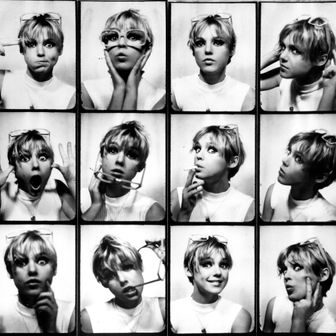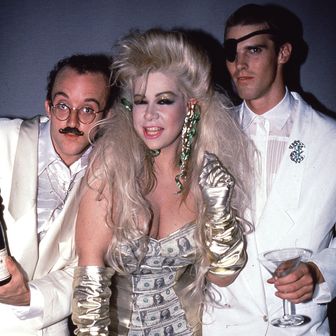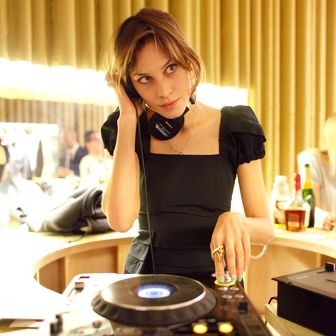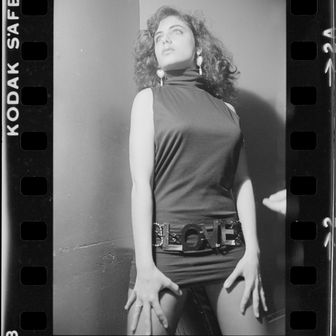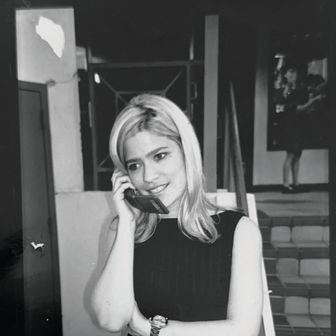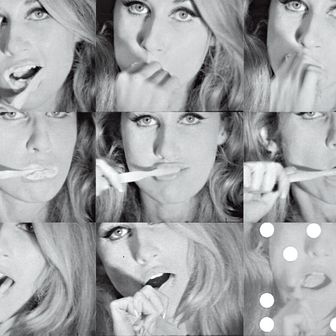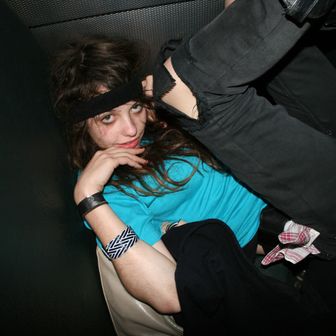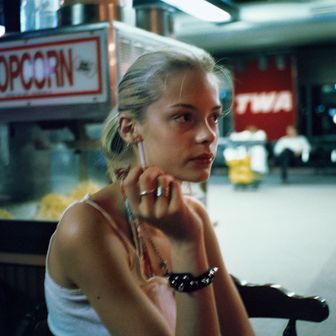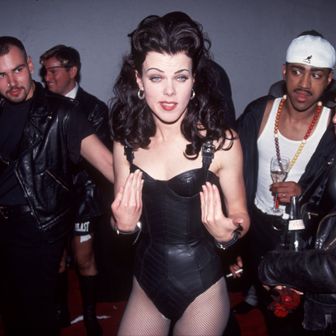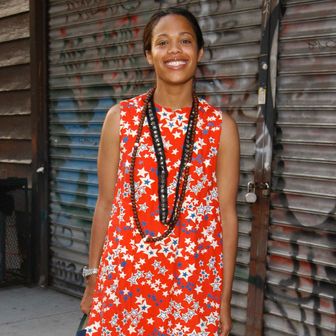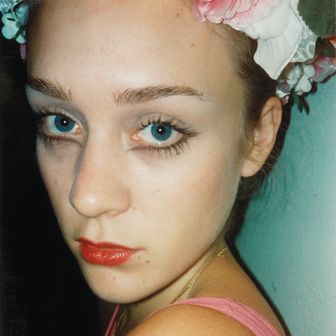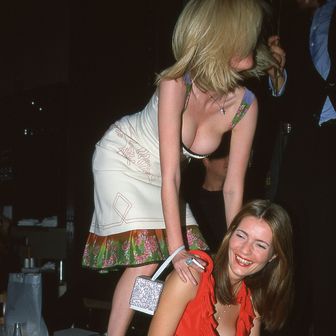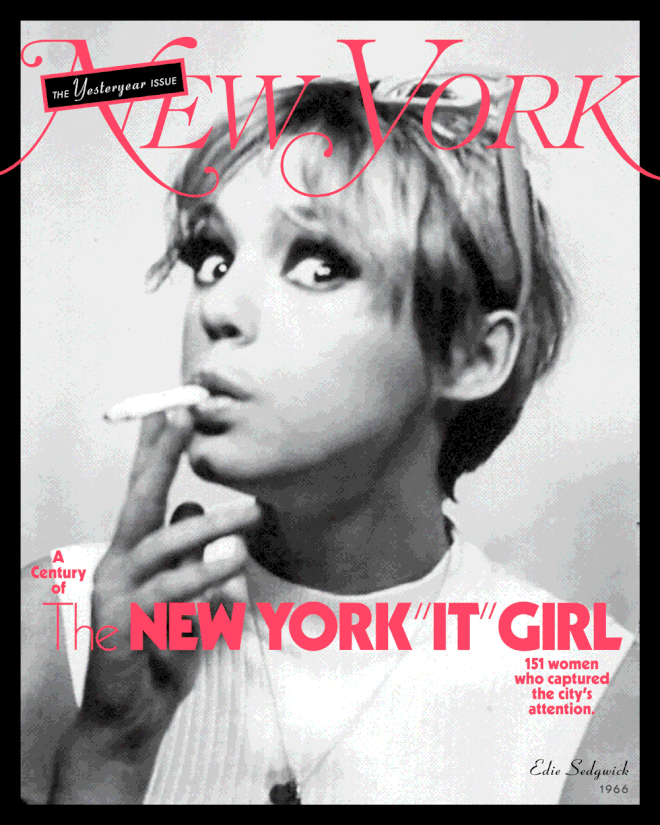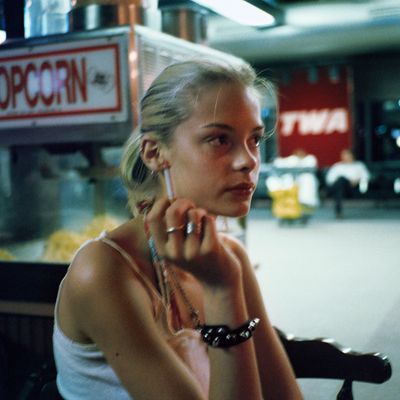
In conversation with Alissa Bennett, a director at Gladstone Gallery and a former model herself.
“James seems quite childlike at times — she’s easily distracted, prone to slouching and staring into space, then snapping to attention in a fit of enthusiasm. She’s physically affectionate in a sweet, unself-conscious way, always hugging people and leaning against them. She can be insecure, like the time she accused a Company Management driver of preferring to drive another model rather than herself, then stalked away, looking as if she might cry. Yet other moments she seems much older than 16, so jaded as to be unshockable. She has a pierced nipple, a large tattoo of a winged fairy on her lower back, refers to people in their 20s as ‘kids’ and frequently invokes her ‘whole life,’ as if this were an endless expanse of time. These contradictions are all present, somehow, in her face, which looks freshly minted in its innocence yet, somehow, knowing.” — Jennifer Egan, “James Is a Girl,” The New York Times Magazine, 1996
Alissa Bennett: So I have to tell you, I’m sure you won’t remember me but there was a Dries Van Noten show that we both did, and I was backstage and you came over and you sat on my chair and you kissed me and I was like, Oh my God, I’ve made it. It’s so funny, it’s something I really remember.
Jaime King: I do remember you, though. How old were you then?
AB: I’m a little older than you, but it was probably like 1998. I think I was 21. You first came to New York in 1993. Is that right?
JK: Yes.
AB: Tell me what that felt like.
JK: I was terrified. I was terrified. I mean, I was a child. I think I was 13 and a half. The first time I came to New York, my mother and I came together, but when she eventually went home, I moved in with one of the editors of Harper’s Bazaar. After that, I was sort of shuffled between different people’s households, you know; basically, wherever my agent told me I should go, that’s where I was placed. I was a child, and this may sound harsh but I believe it’s true: A child at that age should not be in the fashion industry.
Cover Story
AB: And it was right at the beginning that a photo assistant gave you heroin on a shoot, right?
JK: Yeah, I was 14. One of my first shows was Tom Ford for Gucci, and I remember that in front of me was Kate Moss and behind me was Naomi Campbell, so I sometimes wanted to go home but I didn’t want to be sent home. But I also remember being naked as a 14-year-old, 15-year-old, 16-year-old, even at 13 years old, dude, it’s — I remember being naked in a bathtub for Italian Vogue when I was not even 14 years old. I remember being given Champagne, and I never knew what to do with that. How could any child know what it is to do with that? You’re just trying to get through it, and there’s this pervasive terror that if you don’t participate, you’ll be sent home.
AB: I reread “James Is a Girl” this week. What did it feel like when it came out?
JK: I had just turned 16. It was the first time I really felt watched in a different way. I’d already had 5 billion covers, but this was different. I’ll never forget stepping out of my apartment onto the street in New York and everybody was turning around being like, “James, James, stop, stop, stop!”
AB: I know there was a point in your life, 1996 or 1997, when all of your trauma coalesced in a very public way. You had a drug problem that people were writing about; your boyfriend, Davide Sorrenti, had died; the whole country turned your life into a morality play; and in general, I think when our illusion of what your life was like started to slip, it made us really want to get beneath your surface.
JK: After Davide passed, that was the first time I experienced any — I didn’t know what a panic attack was, but I felt like I was always going to die. The cruelest thing was having Bill Clinton, the president of the fucking United States of America, talk about you and the love of your life and describing us as “heroin chic” while displaying our images and distorting them. Do you know what I mean? Like the picture Davide took of me in front of the Kurt Cobain poster. People made it seem like we were glamorizing death, but we weren’t; it was our way of saying something about the kids who were dying too young. And then, of course, as dumb politicians do, especially ones that sexually abuse women like President Clinton — and you can put that in there — he tried to moralize things. So he called us heroin chic as though we were glamorizing something.
AB: It’s probably so hard to parse this out because you were so young, but was there a moment when you were really enjoying modeling and being around these people and being a kind of public persona, or did you feel totally divorced from it? Whenever people get the thing we all want, or perhaps more accurately when they get the thing we think they should want, I always wonder if there’s ever any pleasure or if there’s just too much anxiety attached to public notoriety to even experience it.
JK: That’s when I moved along. It was never about that thing for me.
AB: It’s like planned obsolescence, right? It’s like becoming the new car that was just driven off the lot and immediately depreciates in value. That’s how it felt to me.
JK: Yeah, and I’m not about that. I learned what I wanted to learn, and I saved what I needed to save. And when I left the industry, I was told I was crazy. I was barely 18 years old, and at that time no one appreciated the concept of a multi-hyphenate. You couldn’t be a supermodel and be an actor and a this and a that. I would say that at that time, the one person who was really able to do that was Milla Jovovich, and that was because she started first as an actor.
AB: I remember.
JK: I’ll never forget the reaction, like, “What are you doing? You’re just going to stop?! You’re barely 18, you’re at the height of your career. Why would you walk away from earning as much as you do in a day?” But it wasn’t about the money and fame for me. The purpose of those things is that they offer a sense of freedom, right? But freedom is to be able to have more opportunities, and other than that, those things really have no place for me. That feeling of impending doom is something I never — I don’t want that. I don’t want to live in that state because that state is the state of lack. It’s a terrifying experience to be told at that age that at some point it’s going to “run out.” I never wanted that. I was just there to learn, and I didn’t want to do it on other people’s terms. Those people had a different agenda than I did. I was working and traveling and making a lot of people a lot of money but wasn’t even allowed to open up a bank account. I had zero autonomy.
AB: And no agency, which was another question I had. Like, does the “It” girl have any agency?
JK: The “It” girl immediately indicates that you can also be an “Out” girl. What does it mean to be “It”? Like, “Tag, you’re it”? Like we’re running around on a playground? And built into the construct is the question of how long being “It” lasts because by definition it’s transient, it’s easily permeated. I’ve never wanted to hang my hat on something like that. I’ve been the “It” girl, and it comes and it goes like a breeze. Like, one year you’re “It,” the next year you’re not, then the next five years you’re “It” again, and on and on and on. Like, what does it mean?
AB: Do you think about the girls who were around when you were modeling that you never saw again after you stopped?
JK: I think about them all the time.
AB: Me too.
JK: And that’s fucked up because these are the people and human beings that shaped and formed my early childhood. They were my sisters; they were my mothers. They were, you know, whatever they could be from all places on this planet. You know what I mean? Like from so many different backgrounds and so many different, like, races and classes, and they truly taught me about humanity. You know, they taught me about genital mutilation; they taught me about what it was to be like taken from Russia.
AB: Do you feel free now?
JK: No, I don’t feel free.
AB: Tell me.
JK: I feel … freer. Sometimes, I can feel it. It’s like a light shining under a door, and to me, that’s an accomplishment. It’s an accomplishment.
More on the New York ‘It’ Girl
- ‘It’ Girls in Conversation: Anaa Saber, Maria Al-sadek, and Friends
- Today’s ‘It’ Girls in Conversation: Imani Randolph & Friends
- ‘It’ Girls in Conversation: Ivy Getty and Friends


